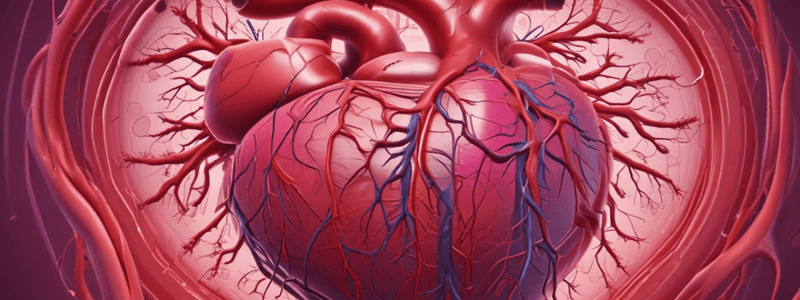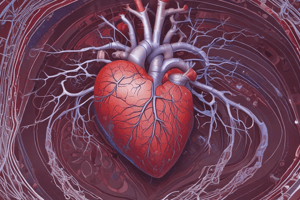Podcast
Questions and Answers
What is the most common cause of myocardial infarction?
What is the most common cause of myocardial infarction?
- Rupture of an atherosclerotic plaque with thrombosis and vasospasm (correct)
- Congenital abnormalities of the coronary arteries
- Spasm of the coronary arteries
- Embolus from a distant site
What is the typical duration of symptoms for an episode of variant angina (Prinzmetal angina)?
What is the typical duration of symptoms for an episode of variant angina (Prinzmetal angina)?
- 10-20 minutes
- Less than 5 minutes
- 5-10 minutes
- Symptoms are unrelated to exertion and can last for an extended period (correct)
What is the typical duration of symptoms for an episode of stable angina (effort angina)?
What is the typical duration of symptoms for an episode of stable angina (effort angina)?
- 1-5 minutes (correct)
- Less than 1 minute
- 5-10 minutes
- 10-20 minutes
Which of the following is a typical characteristic of an infarct in the territory of the left anterior descending (LAD) artery?
Which of the following is a typical characteristic of an infarct in the territory of the left anterior descending (LAD) artery?
Which of the following is a typical characteristic of an infarct in the territory of the right coronary artery (RCA)?
Which of the following is a typical characteristic of an infarct in the territory of the right coronary artery (RCA)?
What is the typical outcome of complete coronary occlusion lasting 20-30 minutes?
What is the typical outcome of complete coronary occlusion lasting 20-30 minutes?
What is the most common cause of sudden death among cases related to myocardial infarction?
What is the most common cause of sudden death among cases related to myocardial infarction?
Which artery's obstruction leads to ECG changes in leads II, III, and aVF?
Which artery's obstruction leads to ECG changes in leads II, III, and aVF?
What type of myocardial infarction results in 'non-ST elevation MI'?
What type of myocardial infarction results in 'non-ST elevation MI'?
During myocardial infarction, which wall of the left ventricle is affected by infarcts when the circumflex artery is obstructed?
During myocardial infarction, which wall of the left ventricle is affected by infarcts when the circumflex artery is obstructed?
Which artery's obstruction may cause ECG changes in the anterior chest leads (V1 - V3)?
Which artery's obstruction may cause ECG changes in the anterior chest leads (V1 - V3)?
'ST elevation MI' or STEMI is commonly associated with which type of myocardial infarction?
'ST elevation MI' or STEMI is commonly associated with which type of myocardial infarction?
Which of the following is the most likely consequence of a complete obstruction of the left anterior descending (LAD) coronary artery?
Which of the following is the most likely consequence of a complete obstruction of the left anterior descending (LAD) coronary artery?
What is the characteristic pattern of angina pectoris caused by Prinzmetal's variant angina?
What is the characteristic pattern of angina pectoris caused by Prinzmetal's variant angina?
Which of the following is a potential complication of a large myocardial infarction?
Which of the following is a potential complication of a large myocardial infarction?
In the setting of an acute myocardial infarction, which of the following ECG findings is most suggestive of a right coronary artery occlusion?
In the setting of an acute myocardial infarction, which of the following ECG findings is most suggestive of a right coronary artery occlusion?
Which of the following factors is most likely to increase myocardial oxygen demand?
Which of the following factors is most likely to increase myocardial oxygen demand?
In the setting of an acute myocardial infarction, which of the following ECG findings is most suggestive of a left anterior descending (LAD) artery occlusion?
In the setting of an acute myocardial infarction, which of the following ECG findings is most suggestive of a left anterior descending (LAD) artery occlusion?
Flashcards are hidden until you start studying






